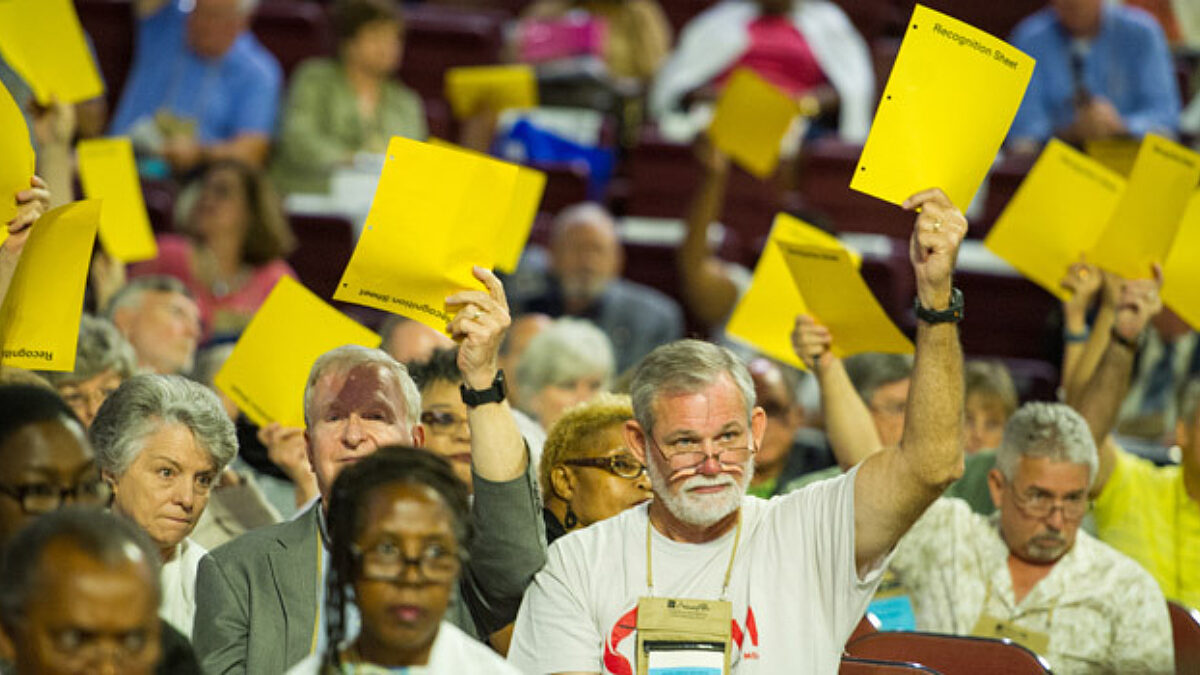
Motion passes on intentional human sexuality dialogue in South Carolina districts, churches
By Jessica Brodie
FLORENCE—United Methodists will intentionally be discussing sexuality, identity, Scriptures and the church in every district in South Carolina.
Annual Conference passed a motion June 8 that asks Bishop Jonathan Holston and district superintendents to hold conversations about human sexuality at the local level so churches can have thoughtful dialogue and build better relationships.
Proposed by the Rev. Wendy Hudson-Jacoby, pastor of North Charleston United Methodist Church, North Charleston, the motion was inspired by General Conference and the Council of Bishops’ “way forward” for unity in the church regarding issues of human sexuality. General Conference in May approved a proposal by the Council of Bishops to defer all petitions on human sexuality (a total of 56) and refer the entire subject to a special commission, named by the COB, to develop a complete examination and possible revision of every paragraph in the UMC Book of Discipline regarding human sexuality.
“In light of the unprecedented action taken by General Conference and the Council of Bishops, I would like to move that we in the South Carolina Annual Conference also engage in intentional and thoughtful dialogue and conversations on human sexuality at the local level,” Hudson-Jacoby said. “Our General Conference through the Council of Bishops is engaging in important and essential conversation regarding sexuality, identity, Scriptures and the church. We believe we are called to engage in important conversations on the local level in our districts and churches. These conversations are already taking place in our society, and we want to be … with them. The heart of the Gospel is built on relationship, and relationship is built on trust and conversation.”
Regardless of the commission’s outcome, the UMC needs to engage in these conversations, Hudson-Jacoby told the body.
Columbia District Superintendent the Rev. Cathy Jamieson noted that her district has already hosted a clergy meeting discussing these issues.
“We have begun not only in the Columbia District but in other districts to address these issues,” Jamieson told the body.
The motion passed overwhelmingly with no debate.
Earlier during Annual Conference, on Monday in a point of personal privilege, Stanton Adams had addressed the body, identifying himself as an openly gay United Methodist serving a local church in the South Carolina Annual Conference.
On behalf of the South Carolina Reconciling Ministries Network, Adams expressed appreciation to Holston and others on the COB for trying to find a way forward for the UMC over the difficult issue of human sexuality. Adams read a letter signed by 68 people at an Reconciling Ministries breakfast Monday offering gratitude, encouraging the bishops to, among other things, include experts and lesbian, gay, bisexual, transgender and queer/questioning people on the commission and offer frequent reports to Annual Conferences on their progress (read the letter here). The letter offered the South Carolina RMN as partners and active participants.
“On behalf of Council of Bishops, we acknowledge deep divisions exist in the church about human sexuality, and we believe there are options beside restructuring and we do not seek to split,” Holston told the body after Adams read the letter on Monday, noting the COB will lead the church in a way forward. “We are committed to a different kind of conservation. The process is one which is new to all of us, and we will seek to do our best.”
RMN is an organization working for full participation of people of all sexual orientations and gender identities in the life of the UMC. It is committed to policy change and the creation of long-term solutions and practices that create full inclusion in the church and the broader society. It works for full equality in membership, ordination and marriage for lesbian, gay, bisexual and transgender people.